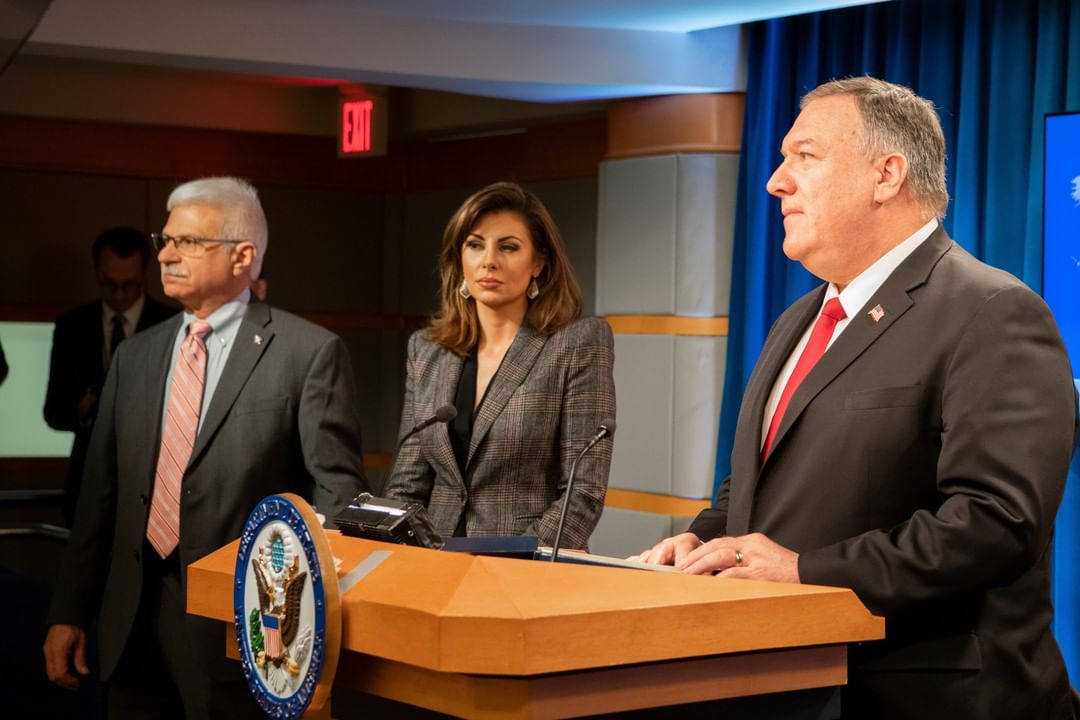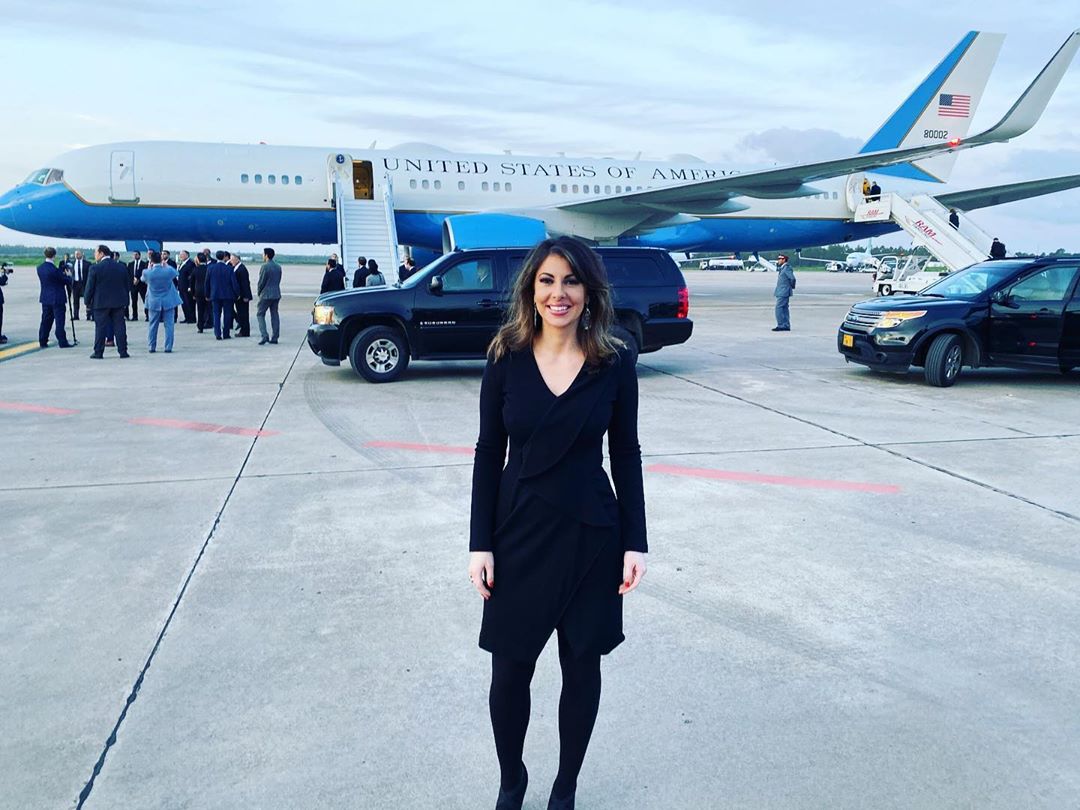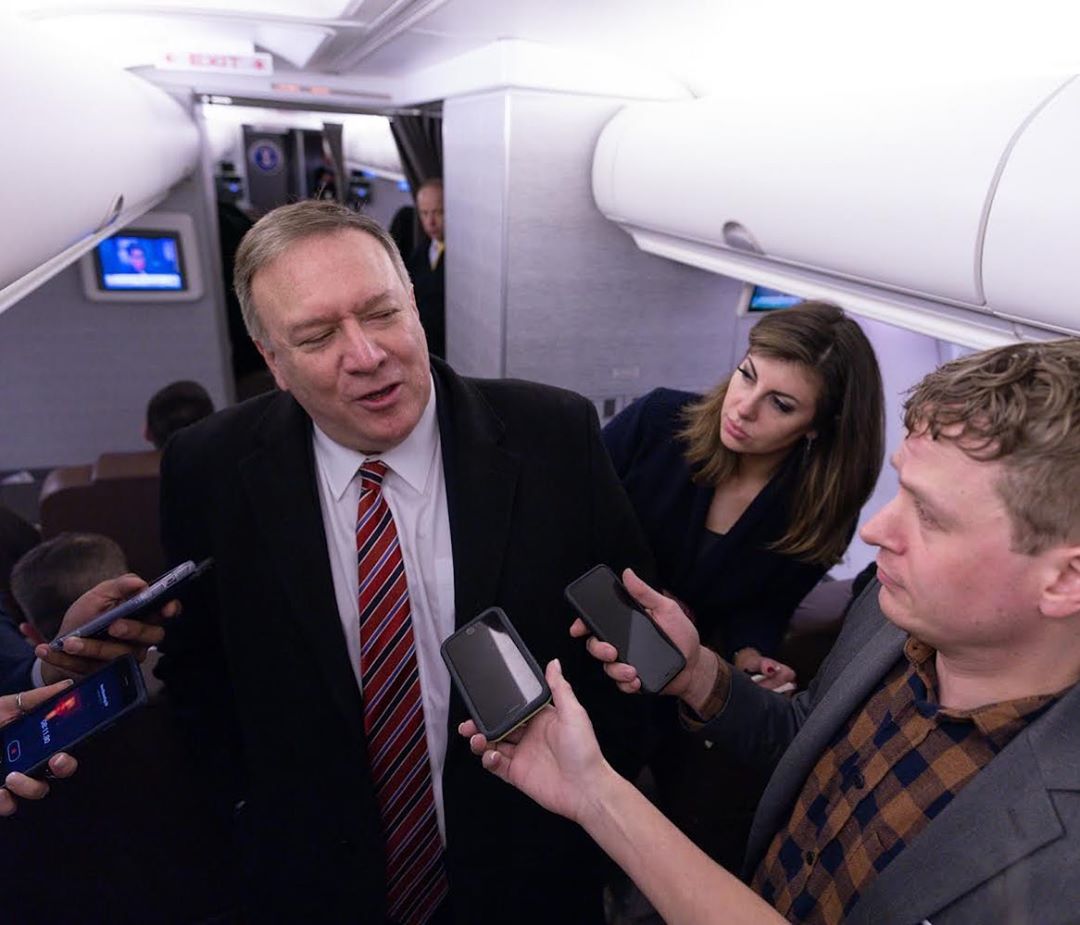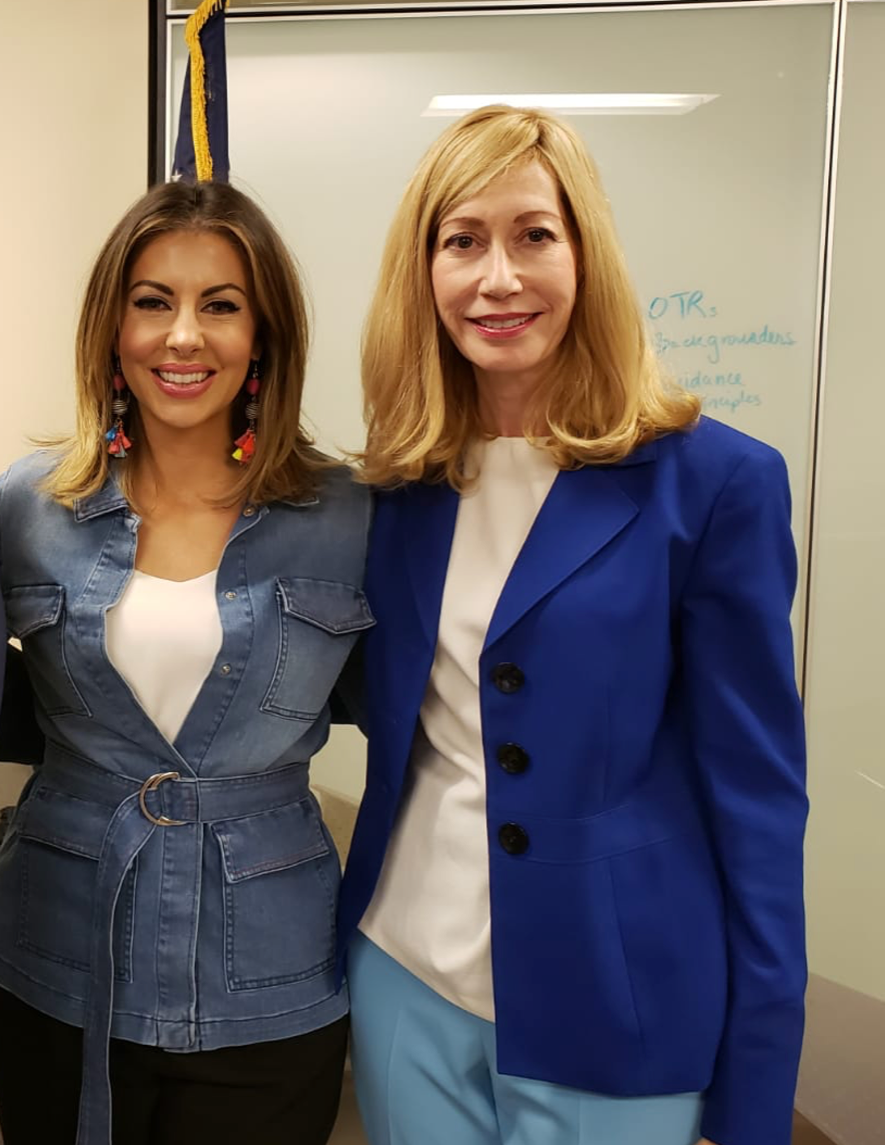US State Department spokesperson Morgan Ortagus is an active Navy Reserve officer who previously served as deputy US Treasury attaché in Riyadh, Saudi Arabia. A career foreign service professional, Ortagus has been the voice of the State Department and Secretary of State Mike Pompeo since April 2019. She has served in both the Obama and Trump administrations.
Ortagus spoke with Felice Friedson about Secretary of State Mike Pompeo’s lightning trip to Israel amid the pandemic, US Israel relations with China, and the frail peace agreement between the Taliban and Afghanistan. She also discussed Prime Minister Benjamin Netanyahu’s push for annexation and to top it off some personal insights into women’s advancement in Saudi Arabia.
To hear the interview, go the Hill on the Middle East podast [1]. A transcript of the interview follows.
The Media Line: Morgan Ortagus is spokeswoman for the United States Department of State and Secretary Mike Pompeo. One of Washington’s most dynamic women, Morgan’s knowledge is firsthand, having served in the military and having lived in the region. It’s an honor to have Morgan with us.
Morgan Ortagus: Well, thank you so much. It’s great to be here as well.

State Department spokesperson Morgan Ortagus stands next to Secretary of State Mike Pompeo (right) and Assistant Secretary for Democracy, Human Rights, and Labor Robert. A Destro as the secretary announces the release of the 2019 Country Reports on Human Rights, March 11, 2020. (statedeptspox Instagram account)
TML: We’re fortunate to have found a time to speak when you’re not in the air with the secretary. Last week, despite the COVID-19 protocols, Secretary Pompeo made a lightning trip to Israel. If its purpose was to generate speculation, it was clearly a success but I suspect the secretary had more in mind. What can you share with us? So much effort for a meal with the prime minister?
MO: Yeah, well, absolutely. I mean, listen, it’s always an honor to be in the Holy Land. We are ecstatic anytime that we can go. We thought obviously as we were getting close to the Israeli government being formed or being officially sworn in, that it was incredibly important for us to go, for us to meet with our many counterparts in the Israeli government, including the prime minister, Benjamin Netanyahu. We also met, of course, [Defense Minister and Alternate Prime Minister] Benny Gantz, the new foreign minister and others, and we obviously have an incredibly close relationship with the State of Israel. This relationship has been incredibly important to the Trump Administration. One of the things that I think all the leadership, from President Trump down through the vice president, the secretary of state and the cabinet, felt it was important to right America’s relationship with Israel. Under the previous administration, we did not feel that this special partnership got the respect that it deserves in Washington and we thought, whether it’s at the United Nations, whether it’s through our bilateral relationship, whether it’s through moving the US Embassy to Jerusalem as required by American law, the Golan Heights, settlements, etc., every action that we have taken is to restore that proper friendship and relationship with the State of Israel. And we think that that’s also instructive for – very realistic for how the American people view the United States’ relationship with Israel.

Morgan Ortagus prior to boarding a flight in Rabat, Morocco, December 2019. (morgan_ortagus Instagram account)
TML: Questions did come up concerning Iran. Is there anything more that you can add to that?
MO: Listen, every time we’re meeting with our counterparts in Israel, the state of Iran is always something that’s at the top of the list and the things we discuss. And that’s because the regime in Iran continually threatens Israel, threatens the United States. But even more than that, you know, they’re an immediate menace to everyone in the region. When you look at the regime, which, [when] you know their people, their leadership, are suffering from coronavirus, they’re suffering from a terrible economy. And we know that any time this regime gets access to money or funds, they’ve proven time and time again that they don’t give that money to their people. They don’t build new schools or roads or infrastructure. Instead, they use that money to fund terrorism and they spend their time funding and equipping and training entities like the Houthis in Yemen, Hizbullah. I mean, you can discuss and go through the list of what they spend their money on, what they spend their time on. We saw several weeks ago, in fact, the Iranians, during the middle of COVID [the coronavirus pandemic], when they’ve lost at least 20 officials, if not more, who have died from the coronavirus during that time, when they should be doing everything they can to protect their people, they were launching satellites, which are in defiance of UN Security Council resolutions. I believe it’s 2231, and that’s really what the regime has shown the world where their priorities are. Their priorities are in funding terrorism and launching satellites that defy UN resolutions, not in taking care of their people or being a responsible member of society. So we’ll continue to work with our counterparts in the Israeli government until we see that that threat has been neutralized, for as long as it takes.
TML: The matter of the nation’s growing economic ties to China is a growing domestic issue in Israel. A major reason Israelis are not happy with the government’s choices vis-à-vis China, is the belief that it will damage relations with Washington. Are they correct?
Give the gift of hope
We practice what we preach:
accurate, fearless journalism. But we can't do it alone.
- On the ground in Gaza, Syria, Israel, Egypt, Pakistan, and more
- Our program trained more than 100 journalists
- Calling out fake news and reporting real facts
- On the ground in Gaza, Syria, Israel, Egypt, Pakistan, and more
- Our program trained more than 100 journalists
- Calling out fake news and reporting real facts
Join us.
Support The Media Line. Save democracy.


MO: So I think that’s a great question and I think that it shouldn’t be about choosing between the United States and China for Israel. Instead, and this goes, by the way, not just for Israel, but this is the same conversation that we have when we’re in the United Kingdom, when we’re in India or Thailand, when we’re in Germany. The conversation that we’ve had with Israeli government leaders has been the same conversation that we have with our friends, partners and allies around the world. And that conversation is really about national security. And you have to look at the investment from the Chinese Communist Party. You have to remember that companies like Huawei are not private companies, like a private telecom in the United States or in Israel, but these are telecoms that are beholden by Chinese law to the Chinese Communist Party and there’s numerous IT professionals that could go through the amount of risk whenever you take what looks to be incredibly cheap 5G, and then you realize, you know, if we were in the middle of the Cold War, we wouldn’t let the Soviet Union be in charge of our infrastructure. And these 5G networks, they’re in charge of all of this infrastructure [and] whenever you install these, then when you also look at crucial national security purchases, when you look at things that are so important to a country’s sovereignty, like their ports, right, like the incredibly impressive world-class technology that innovative entrepreneurs in Israel produce, you have to ask yourself: Why does the Chinese Communist Party want access to this? So we don’t even think it’s about America at all. It’s about what’s best for the Israeli people, what’s best for Israeli national security. And we do not believe decisions that would make Israel beholden to the Chinese Communist Party is what’s best for Israel.

State Department spokesperson Morgan Ortagus staffs a media gaggle with Secretary of State Pompeo on a flight from Washington to London in January 2020. (statedeptspox Instagram account)
TML: Why is Israel not asking the question?
MO: You know, I think, listen, we have certainly – Secretary Mike Pompeo has led the charge on this for the two years that he’s been secretary of state. One of the things that he’s always careful to say in the meetings that I’m with him in, is that he reminds everybody that America, we had it wrong for a long time, too. Listen, we had, before this last NDA, which is our National Defense Authorization, but before that went through, we recently banned Huawei from being a part of America’s, the State Department’s, being part of our national security infrastructure, but we had it wrong for many years, too. We had, we had Huawei in some rural infrastructure in the United States; we’ve got to seek to get that out, to get that right. So we’re by no means claiming, hey, we’ve always had this right. Instead, what we’re saying is under the Trump Administration, under the president’s leadership, we’ve taken a very, very clear idea of the threat that Huawei and the Chinese Communist Party through their Belt and Road Initiative … we’ve taken a very serious look at that and we have said, alright, where did we get this wrong and how do we fix this? And we’re sharing best practices with our friends. We believe in Israeli sovereignty and the ability for the Israeli leadership to make the best decisions. We had something in the United States called, which is called CFIUS, which is the Committee on Foreign Investment in the US. My husband used to be one of the lawyers on that committee. But essentially what they do is they look at every, every international purchase, whether it’s from China or anywhere else in the world. And they look and say, you know, if you’re wanting to buy a piece of land or a company near an American base, for example. If you’re wanting to buy a crucial port, you know, is that in the best interest of American national security? So we would certainly encourage Israel and all of our friends to think carefully to try and build the regulatory system that we have, something similar to CFIUS in the United States, so that they can also scrutinize all foreign investment and determine, hey, here’s what’s best for Israel or for the United Kingdom or whatever country you’re talking to. We’re not saying we’ve had it right as Americans. In fact, we had it wrong for a long time and it wasn’t until President Trump and Mike Pompeo came to the office that we started sounding the alarm and saying, we need to clean up our own house and we also need to alert our friends and partners and allies of the threat as well.

State Department spokesperson Morgan Ortagus conducts an interview with Iran International in January 2020. (statedeptspox Instagram account)
TML: Morgan, another hotly debated issue is that of the proposed annexation of land Israel conquered in the 1967 war, land the Palestinians are claiming for their state-in-waiting. When supporters of the idea argue [that there is] American support, they’re often basing it on Secretary Pompeo’s apparent green light, saying it’s up to Israel. Is this accurate?
MO: So that’s a question that we get a lot. I think one thing that all of your readers and viewers and listeners should know is that this administration works incredibly closely together. So Ambassador Friedman is wonderful. He’s become a very close friend of mine. The same with Jared Kushner and Avi Berkowitz, who are working, you know, who obviously were working for several years on the president’s vision for peace. So whether it’s Secretary Pompeo and Ambassador Friedman or the White House or the president or Jared Kushner, we’re all working incredibly closely. There is no daylight in between us. Sometimes, the media tries to parse what all of us say and put daylight between us. There is no daylight. We’re all working, you know, on this. Listen, it’s not a weekly basis. Even sometimes [there is] a daily basis on this. The secretary [Pompeo] has been clear that he thinks that the, ultimately, this is a decision for the State of Israel. But what we’ve also said, there is no contradiction here, is that we, you know, the president laid out a vision for peace, and that was a plan – you know, when the president says, here’s my, here’s my prerogative, our job at the State Department through Secretary Pompeo and through Ambassador Friedman is to deliver on the president’s vision for peace and to work with all parties if we can to get into the negotiating table. Every decision that we’re going to make is in the context of trying to implement the president’s vision for peace.
Prompter: You are listening to The Hill on the Middle East, hosted by Felice Friedson.
TML: Joining me is Morgan Ortagus, spokeswoman for the State Department. Like China, Russia and Israel share what some see as an unholy alliance. Is Putin king of the hill in crowded Syria?
MO: Syria is interesting. A decade ago, I lived in Saudi Arabia, in Riyadh, as the Treasury attaché to our embassy there, and I was, of course, on the ground in the Middle East whenever the Arab Spring started, and it’s fast-forward a decade later, nine years later. It’s hard to believe that I am still working on this issue. You know, here in the State Department. It is incredibly tragic what we’ve seen happen to the Syrian people, and Ambassador Jim Jeffrey and the State Department lead all of our efforts as it relates to trying to get to a political resolution in Syria. Listen, we know whether it’s Syria or Libya or even Yemen, these places in the Middle East – and they often see the Russians there for nefarious purposes. We often see human rights abuses, people dying in what we think is a very grotesque manner, you know, not in the way you see barrel bombs. We’ve condemned this a lot, the behavior of Putin and the Assad regime in Syria, and it’s a tragedy. But what we do know, ultimately, is there is no military, no way to militarily end any of these conflicts. And so that’s why our job at the State Department, working through people like Ambassador Jim Jeffery and working through you and representatives in Libya and Yemen, is trying to get to political resolutions and trying to get parties to the table. It’s very difficult. You know, you see things like at the United Nations, we’ve watched multiple times when the Russians have blocked that Security Council. Our efforts to get humanitarian aid into Syria. It’s one of the world’s great tragedies but we will continue to do everything that we can at the State Department to get that political and diplomatic resolution.

Morgan Ortagus, then a Treasury Department attaché, with her husband Jonathan Weinberger in Riyadh in 2011. (Courtesy)
TML: Along the same lines, you witnessed a peace process that began between the United States and the Taliban and the joint declaration between the United States and Afghanistan. Will the recent attacks by the Taliban dislodge the frail treaty?
MO: That’s an excellent question. Let me just say it has been a momentous year, year-plus that I’ve been working with Secretary Pompeo and Ambassador Zalmay Khalilzad. We know a couple of things. We know that the end of any conflict is always messy. It’s never a linear path when you’ve been at war for almost 20 years. It’s never a clean, straight linear path to the end. We were very encouraged over the weekend that President Ashraf Ghani and Dr. Abdullah Abdullah were sort of able to agree to sign a document. [They] were able to agree to a political resolution from the election that I think was last September in Afghanistan. We know that Dr. Abdullah now plans on being a part of leading the inter-Afghan negotiations, and so that’s what we’re incredibly focused on. We continue to call out the Taliban whenever they are involved in levels of violence that we think violates or goes beyond the scope of the peace agreement that we signed in February. And similarly, at the same time we had to deal in Afghanistan with a political crisis, with an electoral crisis between Ghani and Abdullah. Uh, it was a huge sigh of relief for everyone this weekend that we did see some resolution between the two of them. And from our perspective at the State Department, what we’re going to continue to push on is for all of Afghan society to be at the negotiating table for interactive dialogue. And that includes the Taliban, that includes Dr. Abdullah, who will be leading the government of Afghanistan. That includes civil society and women. You know, you won’t have peace in Afghanistan until you have all of these parties at the table. But one of the things we know is unacceptable to President Trump is continued loss of American life in Afghanistan. So, we want to make sure when we’re sending our young men and women anywhere around the world in harm’s way, that the American people understand the mission. They understand why they are there, that they understand the amount of taxpayer dollars that are going into Afghanistan. So a guiding principle for us, that we remain committed to, is that we want to make sure that Afghanistan is never again a place where terrorists have safe harbor and can plan attacks on the United States.
TML: The administration’s position early on was that ISIS was defeated. What is the active assessment now?
MO: I think that that was, that what you were referring to was probably the assessment that the president gave in Iraq. One of the things that I think is important to characterize when we talk about defeating the physical caliphate of ISIS, we have had enormous success in Iraq focusing on that in this administration. Our anti-ISIS coalition there is robust, and important men have done great work over there these past three and a half years. There’s a big difference between being able to destroy the physical caliphate of ISIS, and to be able to destroy an ideology. We know that we’re never going to be able to destroy any sort of nefarious ideology outright; that there will always be people that will be attracted to this sort of extremism, but our job is to continue to make sure that the physical caliphate that ISIS got set up throughout the Middle East and Southeast Asia is not allowed to return.

Morgan Ortagus attends a Hanukkah celebration in Saddam Hussein’s former palace in Baghdad, 2007. (Courtesy)
TML: You recently tweeted [to] avoid the coronavirus and sanction risks by keeping Mahan Airlines out of your country. Morgan, can you share the back story?
MO: Yeah, that’s really interesting. You know, one of the things that we know is that while the Iranian regime was lying to the people in the world about the severity of the outbreak in Iran, and by the way, we still don’t have accurate numbers in Iran. In fact, there’s a great piece out in The New Yorker just this morning that I encourage everybody to read, by Dexter Filkins, who, who I’m just about halfway through the piece myself at the moment. But there’s been some great investigative journalism into places like Iran and China, where we know that there’s no other way to characterize this, but they’ve flat out lied about their numbers. They’ve lied about the number of people infected with coronavirus. They’ve lied about the number of people who have perished from coronavirus. So, we know that while the regime was not even, in Iran, was not even reporting the number of, you know, the number of cases of people dying or people being infected, you know, Mahan Air was flying to and from China. They were flying into Lebanon. And this was at a time when, you know, the world was aware of the threats and from coronavirus. The president, President Trump had already blocked at that point travel from China to the United States. And so countries around the world need to understand that when Mahan Air flies into, into or out of your country, that you’re dealing with a country who has not taken the coronavirus seriously. It directs havoc on their people and is, you know, you’d have to talk to scientists or doctors, but I think you could easily argue that what is partly responsible for the threat is this airline.
TML: When you were stationed in Riyadh, did you think that women’s rights would begin to evolve one decade later?
MO: No, I did not. I thought that it would happen eventually. We were back, I think it was February when we were in Saudi Arabia, and I went where I used to live, which is called the Diplomatic Quarter. In the Diplomatic Quarter, we walked around and there was restaurants and men and women having dinner together, and some people were covered with their hair, some people weren’t. It was fascinating. It was just a totally different country than the one that I lived in a decade before. Yeah, women can obviously drive now. Things that you always thought that Saudi would eventually open up and do, and then all of a sudden when they happen, you know, you know it’s shocking whenever you live there. A friend that I was having dinner with brought up a great point, you know. He went through the statistics of just how young the country is. Saudi Arabia is an incredible young population, and these young people will grow up in a Saudi Arabia where it is normal for women to drive. It’s normal for people to mix in social settings. It’s normal for women to have the right to choose about covering their hair, you know, whatever they feel is best for them and their family. And so I think that’s certainly an encouraging sign that you’ve got a new generation that’s growing up in a new normal in Saudi Arabia.

Morgan Ortagus spent several months in Baghdad in 2007 as a public affairs official for USAID. (Courtesy)
TML: One of the nation’s most high-profile women. Who was your role model and why?
MO: I always think of Dr. Condoleezza Rice, who was obviously secretary of state for President Bush. When she entered the first Bush administration, I was still in college. When I came out of college and went to my first job, I remember printing her picture and her bio and putting it on my wall and saying, you know, I’m going to be like her one day. I’m going to grow up to be like this woman. And these, for many women, I think that were, you know, young during the Bush administration, or young adults in the Bush administration, she’s, she’s someone that was really a trailblazer for women in national security. And you know, somebody that I, that I still admire to this day.

Felice Friedson, president and CEO of The Media Line, with State Department spokesperson Morgan Ortagus. (The Media Line)
TML: Morgan Ortagus, spokeswoman for the State Department and Secretary of State Mike Pompeo, thank you for your time and your insights.
MO: Great, thanks. I appreciate it. Thanks for having me.